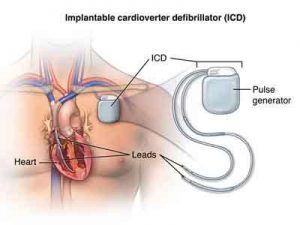- Home
- Editorial
- News
- Practice Guidelines
- Anesthesiology Guidelines
- Cancer Guidelines
- Cardiac Sciences Guidelines
- Critical Care Guidelines
- Dentistry Guidelines
- Dermatology Guidelines
- Diabetes and Endo Guidelines
- Diagnostics Guidelines
- ENT Guidelines
- Featured Practice Guidelines
- Gastroenterology Guidelines
- Geriatrics Guidelines
- Medicine Guidelines
- Nephrology Guidelines
- Neurosciences Guidelines
- Obs and Gynae Guidelines
- Ophthalmology Guidelines
- Orthopaedics Guidelines
- Paediatrics Guidelines
- Psychiatry Guidelines
- Pulmonology Guidelines
- Radiology Guidelines
- Surgery Guidelines
- Urology Guidelines
Popranolol superior to Metoprolol in electrical storm in ICD patients

The combination of intravenous (IV) amiodarone and oral propranolol is safe, effective, and superior to the combination of IV amiodarone and oral metoprolol in the management of electrical storm (ES) in implantable cardioverter-defibrillator (ICD) patients, according to a study published in the Journal of the American College of Cardiology.
The study was conducted by Sofia Chatzidou, School of Medicine, National and Kapodistrian University of Athens, Greece, and colleagues to compare the efficacy of a nonselective β-blocker (propranolol) versus a β1-selective blocker (metoprolol) in the management of ES.
Electrical storm is a life-threatening condition of cardiac electrical instability characterized by 3 or more sustained episodes of ventricular fibrillation (VF), ventricular tachycardia (VT) or ICD shocks within a period of 24 hours. It is observed in approximately 30% of patients with ICDs and is associated with high mortality rates.
Sympathetic blockade with β-blockers, usually in combination with IV amiodarone, have proved highly effective in the suppression of ES.
For the study, 60 ICD patients (45 men, mean age 65.0 ± 8.5 years) with ES developed within 24 h from admission were randomly assigned to therapy with either propranolol (160 mg/24 h, Group A) or metoprolol (200 mg/24 h, Group B), combined with IV amiodarone for 48 h.
Key Results:
- Patients under propranolol therapy in comparison with metoprolol-treated individuals presented a 2.67 times decreased incidence rate of ventricular arrhythmic event and 2.34 times decreased rate of ICD discharges during the intensive care unit (ICU) stay.
- At the end of the first 24-h treatment period, 27 of 30 (90.0%) patients in group A, while only 16 of 30 (53.3%) patients in group B were free of arrhythmic events.
- The termination of arrhythmic events was 77.5% less likely in Group B compared with Group A.
- Time to arrhythmia termination and length of hospital stay were significantly shorter in the propranolol group.
Based on the study, the authors concluded that oral propranolol is more effective and safe as compared to oral metoprolol in the treatment of ES in ICD patients, when used in combination with IV amiodarone.
For further information click on the link: 10.1016/j.jacc.2018.02.056

Disclaimer: This site is primarily intended for healthcare professionals. Any content/information on this website does not replace the advice of medical and/or health professionals and should not be construed as medical/diagnostic advice/endorsement or prescription. Use of this site is subject to our terms of use, privacy policy, advertisement policy. © 2020 Minerva Medical Treatment Pvt Ltd